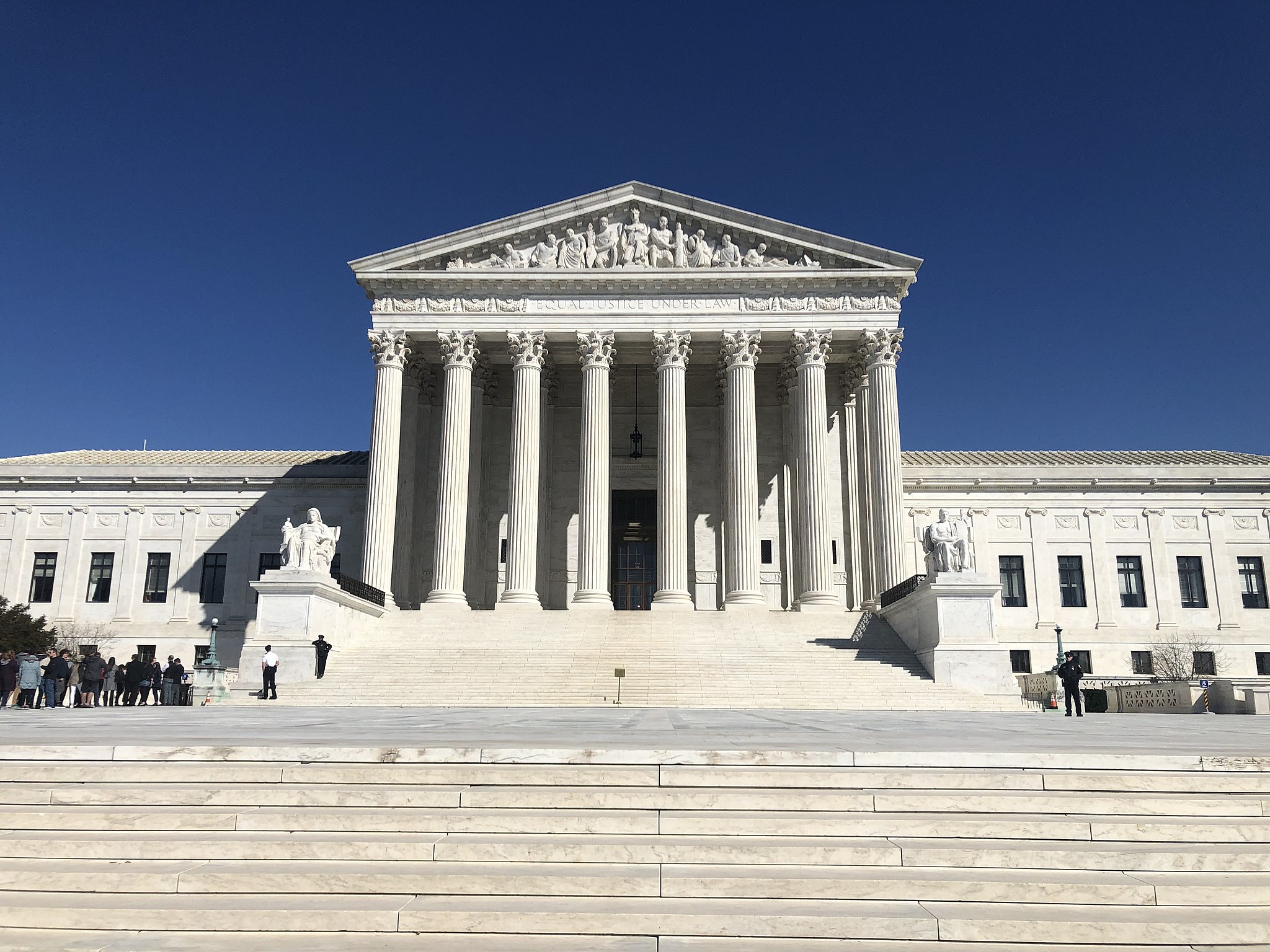Turkiye Halk Bankasi A.S. v. United States, Part 2: What to Do If the FSIA Does Not Apply?
Part 2 of a three-part series on oral arguments in Turkiye Halk Bankasi A.S. v. United States, a case that raises the question whether the U.S. government can criminally prosecute corporations owned by foreign states.

Published by The Lawfare Institute
in Cooperation With

Editor's Note: This is the second in a three-part series on oral arguments in Turkiye Halk Bankasi A.S. v. United States. Click here for part one and here for part three.
Our first article argued that the best reading of the FSIA’s text and structure is that it confers immunity on foreign states in criminal as well as civil cases. That conclusion follows from the plain language of § 1604 of the FSIA, which states that foreign states “shall be immune from the jurisdiction” of both federal and state courts except as otherwise provided in the FSIA. It is also consistent with Congress’s comprehensive effort in the FSIA to regulate the immunity of foreign states and their instrumentalities, and it avoids potential conflicts that might otherwise arise under international law. By contrast, as we also explained in the first article, the exceptions to immunity in § 1605 of the FSIA are best read to apply only to civil cases. That reading is consistent with Congress’s effort to codify the restrictive theory of immunity, and it makes sense of the FSIA’s removal provision, which is limited to civil cases, as well as other FSIA provisions.
The United States argues, by contrast, that the entire FSIA, including § 1604, is limited to civil cases. We explained in the previous article why we find that argument unpersuasive. In this article, however, we assume that the government is right that the FSIA does not address the immunity of foreign sovereigns in criminal cases, and we consider what law, if any, would govern such immunity. We canvass various possibilities, and in the end argue that the best answer (although one not free from difficulty) is to allow the executive branch to determine whether sovereign immunity is granted in criminal cases, in both federal and state court, unless and until Congress regulates the issue.
No Domestic Immunity
One possibility is that there is simply no domestic law of immunity in criminal cases brought against foreign states or their instrumentalities. The Supreme Court has recognized some common law immunities, in both criminal and civil cases, based on what had been established at common law. In civil rights cases brought under 42 U.S.C. § 1983, for example, the Court has sometimes applied immunities that it has described as “well grounded in history and reason.” There is no developed “history and reason” backdrop like this for foreign sovereign immunity in criminal cases, in part because there have been very few such cases. It may just be, therefore, that foreign states and their instrumentalities have no common law defense to criminal liability.
This outcome seems unacceptable for several reasons. First, while there is debate over whether and to what extent international law requires the conferral of immunity in criminal cases brought against state-owned instrumentalities, almost everyone agrees that it would violate international law for a nation to criminally prosecute another foreign state in its courts. (This rule of international law likely explains why there is no developed domestic practice in support of a common law doctrine of criminal immunity.) A conclusion that there is no immunity in these cases would allow for the prosecution of foreign states themselves, in violation of international law, which even the U.S. government acknowledges should not happen.
Second, this problem may extend to criminal prosecutions against state-owned instrumentalities in certain contexts. The United States does not argue that international law always permits criminal actions against instrumentalities but, rather, that it does so for “the commercial activities of foreign government-owned corporations like petitioner” (emphasis added). This qualification suggests that in situations in which instrumentalities engage in sovereign rather than commercial activities, they may be entitled to immunity from prosecution under international law, which they will not receive if there is no domestic immunity in criminal cases whatsoever.
Third, even if courts could trust federal prosecutorial discretion to preclude problematic criminal suits against foreign sovereigns in federal court, that federal discretion by itself would not be a check on state criminal prosecutions. If the FSIA is inapplicable to criminal prosecutions, and there is no domestic common law immunity, it would likely mean that states are free to prosecute foreign governments and their instrumentalities in situations in which the federal government has concluded that it is improper under international law to do so. Again, no one seems to think that this would be an acceptable situation. (This is one reason why we argued in our first article that § 1604 of the FSIA, which applies expressly to state courts, precludes such prosecutions.)
Dormant Foreign Affairs Preemption
It might be argued that the concern with state prosecution of foreign states and their instrumentalities could be addressed through some sort of judicially enforced preemption doctrine. In the absence of a preemptive statute or international agreement, the most likely option is “dormant foreign affairs preemption,” based on the Supreme Court’s 1968 decision in Zschernig v. Miller. In that decision, the Court held invalid an Oregon inheritance statute that discriminated against communist countries, reasoning that the law “affects international relations in a persistent and subtle way.”
The scope of the Zschernig decision has always been mysterious, and, in the more than 50 years since it was issued, the Supreme Court has never applied it. As we suggested in our first article, it seems unlikely that Congress would have been relying on this vague and uncertain doctrine as sufficient protection against the possibility of state court criminal prosecutions against foreign sovereigns. The fact that Congress specifically allowed for removal of state court civil cases against foreign sovereigns suggests that it did not think all state court adjudication should be prohibited, and Zschernig would be a clumsy and unpredictable tool by which to make a criminal-versus-civil distinction, or a distinction between prosecutions of foreign governments and their instrumentalities, or a distinction between different criminal offenses.
In any event, the current viability of dormant foreign affairs preemption under Zschernig is in doubt. The Supreme Court seemed to go out of its way in American Insurance Association v. Garamendi not to rely on the doctrine, and the majority there suggested (cryptically) in a footnote that if the doctrine is still viable it has limited scope. And regardless of what Zschernig currently stands for, if it is appropriate for the federal government to prosecute state-owned instrumentalities, as the U.S. government claims, it is not clear what ground there would be for claiming that state efforts to enforce their criminal law in a like manner should be preempted.
Apply International Law as Federal Common Law
Yet another possibility, although not one specifically advocated in the briefs in Halkbank, would be to treat customary international law, including the customary international law of sovereign immunity, as self-executing federal common law in criminal cases. That approach would potentially impose some check on state courts because they would be bound to apply whatever international law limitations exist in this context, subject to potential review in the Supreme Court. The core problem with this approach, as we have explained in detail in other writings, most recently here, is that it would be completely inconsistent with the nature of post-Erie federal common law.
The Supreme Court has made clear that federal common law is appropriate in only “few and restricted instances” and must be “tethered” to existing federal policy. An automatic pass-through of customary international law (which covers a multitude of topics) into federal law, without political branch incorporation, is inconsistent with that regime and is also more generally at odds with the Constitution’s structural requirements for making federal law and applying it to displace state law. This approach would also produce other anomalies. For example, the Supreme Court has sharply restricted the circumstances under which treaties operate as self-executing federal law, even though treaties, unlike customary international law, are specifically approved by the Senate and the president. It would make no sense to say that Congress must often act to bring treaty norms into U.S. federal law but that customary international norms—which often have a content similar to the treaty norms, except that they typically lack the definitive input of the federal political branches—automatically become part of federal law.
There are many other problems with the “automatic incorporation” view. A final one worth mentioning here is that this approach might not impose adequate checks on state courts. Not only is it unclear whether or to what extent state-owned instrumentalities are entitled to immunity in criminal proceedings, but there may be foreign policy reasons for avoiding such prosecutions even when they are not clearly inconsistent with international law.
Hybrid Federal Common Law
Yet another approach might be for courts to develop a federal common law doctrine of immunity to preempt state court prosecutions that would reflect a mix of considerations, including those related to international law and comity, but that would have a basis in federal policy as reflected in the FSIA, other federal statutes, and perhaps executive branch practice. As we have written elsewhere, to the extent that it is ever appropriate for international law to inform federal common law, it would be in this hybrid fashion that is grounded in positive federal law. Depending on how it is formulated, a federal common law rule might allow for sufficient protection of foreign policy interests without implicating the problems associated with simply channeling customary international law into federal law.
The biggest problem with this approach is that it has little to no grounding in federal statutes and thus would require a significant amount of judicial policymaking discretion in an area in which the courts lack much competence. As the Supreme Court has emphasized, “The political branches, not the judiciary, have the responsibility and institutional capacity to weigh foreign-policy considerations.”
One of the amicus briefs in Halkbank insists that the courts, not the executive branch, should determine the contours of this federal common law, but the brief tellingly says little about the positive law basis for doing so, or how the courts should actually go about developing it. The brief notes that the Supreme Court declared the act of state doctrine to be a rule of federal common law in its 1964 Sabbatino decision, but that case involved an established and discrete common law rule, and it had the effect of excluding applications of customary international law in the domestic realm. By contrast, the courts would have to design a federal common law of foreign government immunity for criminal cases, perhaps distinguishing (among other things) between foreign governments and their instrumentalities, between federal and state criminal prosecutions, and between different types of criminal offenses. As noted, the Court in recent decades has been highly skeptical of this sort of judicial lawmaking discretion.
To be sure, gap-filling by the federal courts is sometimes appropriate as part of their application of a statutory scheme. The Supreme Court allowed this in an FSIA case, First National City Bank v. Banco Para el Comercio Exterior de Cuba, where it developed a federal common law rule to determine when a foreign state instrumentality should be considered separate from the foreign state for purposes of a counterclaim allowed under the FSIA. In doing so, the Court considered “principles ... common to both international law and federal common law, which in these circumstances is necessarily informed both by international law principles and by articulated congressional policies.” But designing an immunity regime for all criminal cases, outside the ambit of the FSIA, is not remotely like that sort of discrete statutory gap-filling.
Executive Branch Control
The final approach, and the one that we think is the most persuasive overall (although not free from difficulty), is to recognize executive authority to make determinations about sovereign immunity issues that are not covered by the FSIA. This is, not surprisingly, the position of the solicitor general.
This sort of executive control was endorsed by the Supreme Court for several decades prior to the enactment of the FSIA. For example, the Court made clear in Republic of Mexico v. Hoffman (1945) that “[i]t is … not for the courts to deny an immunity which our government has seen fit to allow, or to allow an immunity on new grounds which the government has not seen fit to recognize.” In its first decision under the FSIA, Verlinden BV v. Central Bank of Nigeria, the Court described the history as follows: “This Court consistently has deferred to the decisions of the political branches—in particular, those of the Executive Branch—on whether to take jurisdiction over actions against foreign sovereigns and their instrumentalities.” This deference was given regardless of the underlying state of international law. As Louis Henkin noted in his foreign affairs law treatise, the executive branch policies on sovereign immunity, either “generally, or for the particular case,” were treated by courts as binding “regardless of what international law might say about them.”
Even though this approach is supported by pre-FSIA precedent, it might appear to raise a separation of powers issue because the executive would be making determinations that have legal effects. While this is a legitimate concern, several executive powers related to foreign affairs are already understood to have domestic legal effects. One example is the implied power over recognition of foreign states, which the Supreme Court in Zivotofsky v. Kerry noted had a variety of legal effects. Another example is the power to make sole executive agreements, which (among other things) can preempt state law. It is thus not a large stretch, especially in light of the pre-FSIA practice and supportive judicial precedent, to conclude that the executive’s authority relating to foreign affairs carries with it some authority to decide whether to accord a foreign state with immunity in the absence of congressional regulation.
In addition, sovereign immunity implicates issues of customary international law, and the Supreme Court has noted that the executive branch, as the lead foreign policy organ of the government, plays a role in that law’s development. As the Court observed in Sabbatino, “the Executive Branch speaks not only as an interpreter of generally accepted and traditional rules, as would the courts, but also as an advocate of standards it believes desirable for the community of nations and protective of national concerns.”
This executive-branch-control approach to sovereign immunity also provides a potential solution to the puzzle of state criminal law prosecutions if the FSIA is construed to be limited to civil actions. If the executive branch is the source of immunity determinations in the domestic realm in this context, that determination, as an embodiment of national policy, would likely be binding on states. If so, executive control of the issue helps alleviate the danger of unchecked state criminal prosecutions because the executive branch, by recognizing immunity in an individual case, could bind the state courts to dismiss the case. At the same time, it would avoid the structural and other problems associated with deeming customary international law automatically to be part of federal law. And it would allow for recognitions of immunity, for foreign policy reasons, even when not dictated by international law.
Finally, and very important to the overall argument, one need not rely simply on inherent executive authority to reach this conclusion. If, contrary to what we argued in our first article, Congress did not address the sensitive issue of sovereign immunity from criminal prosecutions in the FSIA, Congress in the FSIA can be read as having accepted a continuation of the executive control over immunity exercised prior to the enactment of the statute. In that sense, the issue of executive authority here is akin to the one in Dames & Moore v. Regan, where the Court concluded that Congress had in effect authorized the executive settlement-of-claims authority by legislating against its long backdrop without indicating any disapproval of it. That is also what the Court appears to have suggested in Samantar v. Yousuf (2010). In concluding in that case that the FSIA did not address the immunity of individual foreign officials, it noted that it had “been given no reason to believe that Congress saw as a problem, or wanted to eliminate, the State Department’s role in determinations regarding individual official immunity.” And, as one of us has documented elsewhere, it is what most lower courts have assumed since Samantar.
Conclusion
For these reasons, if § 1604 of the FSIA is construed not to apply to criminal cases, the best approach, we contend, is to treat the immunity issue as subject to executive branch determination. The executive branch can assess the relevant customary international law backdrop and make determinations about how that law should be enforced and developed when deciding whether to bring federal prosecutions. And it can intervene in state court proceedings to stop prosecutions against states and their instrumentalities when it concludes that those prosecutions are problematic. This executive authority would merely be a default, and Congress could regulate it if it wanted a different regime.
To be clear, we do not consider this to be a first-best approach in Halkbank. Among other things, as compared with the pre-FSIA cases in which the executive branch was allowed a determinative role (or as compared with the lower court cases after Samantar concerning foreign official immunity), the separation of powers concerns seem stronger in a federal criminal case, in which the government is both acting as prosecutor and purporting to decide whether the defendant has immunity. There are also federalism concerns when the federal government seeks to impose this authority on state criminal prosecutions. As we argued in the first article, the Court need not commit to this executive branch role if it applies § 1604 as written.





